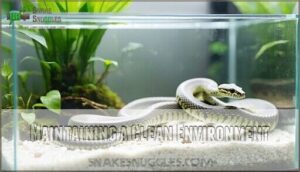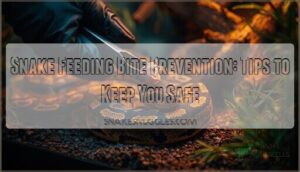This site is supported by our readers. We may earn a commission, at no cost to you, if you purchase through links.

You’ll need to tackle the big three: location, smell, and sound.
Choose a quiet room where parents rarely go.
Use air purifiers to eliminate any reptile odors that might give you away.
Keep feeding schedules quiet and dispose of waste carefully.
However, hiding a snake comes with serious risks.
Snakes need proper heating, lighting, and veterinary care that’s tough to manage secretly.
Emergency situations become dangerous when parents don’t know about your pet.
The smarter move is to build a case for responsible ownership and earn their trust first.
Table Of Contents
- Key Takeaways
- How to Hide a Snake From Your Parents?
- Finding a Hiding Spot
- Eliminating Pet Odor
- Minimizing Pet Noise
- Providing Essential Supplies
- Maintaining a Clean Environment
- Risks of Hiding Pets
- Persuading Parental Approval
- Importance of Patience
- Ethical Pet Ownership
- Frequently Asked Questions (FAQs)
- How to make a snake hide?
- Do snakes need a hiding spot?
- Will my snake come out of hiding?
- Why is snake hiding important for pet reptiles?
- Why do pet snakes hide?
- Do snakes hide in captivity?
- What brings a snake out of hiding?
- Do snakes stay with their parents?
- How long will a snake stay in hiding?
- Can I keep a snake I found?
- Conclusion
Key Takeaways
- You’ll need to focus on three main challenges when hiding a snake: finding a quiet location your parents rarely visit, eliminating reptile odors with air purifiers and regular cleaning, and minimizing noise through soundproofing and background sounds.
- Your snake’s health will suffer from secret ownership since you can’t provide proper heating, lighting, veterinary care, or emergency treatment without risking discovery by your parents.
- You’ll face serious financial risks including mounting supply costs, increased electricity bills from heat lamps, expensive snake food, and unexpected veterinary expenses that can quickly drain your budget.
- You’re better off building trust with your parents through education and demonstrating responsibility rather than hiding a snake, since transparency prevents long-term suffering for both you and your pet while avoiding ethical dilemmas.
How to Hide a Snake From Your Parents?
You’re probably wondering if you can successfully hide a snake from your parents, but here’s the reality check you need.
Secret pet ownership creates serious problems with Snake Security and Emergency Vet access.
Hidden snakes face real dangers when emergencies strike and parents discover the truth.
Long-Term Plan strategies rarely work because Vivarium Concealment is nearly impossible.
Instead of risking avoid detection schemes, focus on earning parental trust through education and responsibility demonstrations.
Finding a Hiding Spot
Success in finding the right snake hiding places starts with choosing rooms your parents rarely visit.
Unused basements or garages offer ideal secure enclosures with proper ventilation needs. Consider your backyard if you can create discreet access to a weatherproof setup.
Temperature control becomes easier in climate-controlled spaces like spare bedrooms. When evaluating camouflage options, look for areas where a snake enclosure blends naturally with existing storage.
If no suitable location exists at home, ask trusted friends to temporarily house your secret pet until you find better hiding items storage solutions.
Eliminating Pet Odor
Snake odors can give away your secret pet faster than any other warning sign.
You’ll need to establish regular cleaning routines and use air fresheners to keep your hidden snake undetected.
Cleaning Routines
Maintaining a clean reptile enclosure requires consistent effort and the right approach.
Establish solid cleaning routines to prevent odors from betraying your secret snake habitat.
Your daily maintenance should include:
- Spot-clean waste immediately using reptile-safe disinfectant
- Replace substrate weekly to maintain proper hygiene
- Deep-clean monthly with specialized odor eliminators.
Schedule consistency prevents odor control issues that could expose your hidden pet.
Air Fresheners
Beyond cleaning routines, air fresheners help mask lingering snake scents.
Choose pet-safe options and avoid chemical-heavy sprays near your reptile’s habitat.
Natural odor neutralizers like baking soda work better than synthetic air fresheners for scent masking.
Many owners seek safe odor control for their homes.
| Safe Options | Avoid These |
|---|---|
| Baking soda | Scented candles |
| White vinegar | Chemical sprays |
| Natural alternatives | Strong diffusers |
Proper air quality protects your snake’s health.
Minimizing Pet Noise
Snakes can create unexpected sounds when they move around their enclosure or knock over water bowls.
You’ll need to use soundproofing methods and background noise to keep these sounds from reaching your parents’ ears.
Soundproofing Techniques
When soundproofing your snake’s space, focus on wall dampening and door insulation to contain any noise.
Strategic vivarium placement away from shared walls helps too.
Soundproofing techniques that work:
- Install acoustic materials like foam panels or cork boards
- Add thick curtains for extra noise absorption
- Place rugs under doors to seal gaps
- Use carpet or mats for vibration reduction
- Choose quiet ceramic heat emitters
Masking Sounds
Background noise from a TV or stereo effectively masks subtle sounds from your snake’s habitat.
White noise machines provide consistent ambient noise that covers feeding movements or substrate shifting. Strategic frequency masking works better than complete silence.
Ball pythons can sometimes make noises related to respiratory or shedding issues.
Position your noise cancellation device near the enclosure for ideal sound absorption and vibration dampening effects.
Providing Essential Supplies
Your snake needs proper supplies to stay healthy and comfortable in its hidden space.
You’ll need to purchase food, water containers, and hiding spots while keeping these items completely out of sight from your parents.
Food and Water
Feeding your snake means establishing a secret feeding schedule that won’t raise suspicions.
Store frozen rats/mice in unmarked containers deep in the freezer. Thaw them quietly before feeding time.
Place a sturdy water bowl in a corner where it won’t tip over. Clean up any food waste immediately to prevent odors from giving away your hidden snake.
You can easily acquire frozen reptile food online.
Toys and Enrichment
Mental stimulation needs are essential for your snake’s wellbeing.
Create DIY options like puzzle feeders from toilet paper tubes or add climbing branches to prevent boredom.
Interactive toys and safe toys provide behavioral benefits while reducing stress.
Consider providing items for enhanced snake activity.
Enrichment importance can’t be overstated – a stimulated snake is less likely to attempt snake escape from its snake vivarium, keeping your secret safer.
Bedding and Litter
Behind every successful snake hiding operation lies proper bedding and litter management.
Your terrarium needs absorbent substrate like cypress mulch or reptile carpet for odor control.
Avoid clumping cat litter – it’s dangerous for snakes.
Change bedding weekly to maintain snake safety and prevent detection.
Essential bedding supplies for hiding litterbox success:
- Non-toxic substrates that absorb moisture effectively
- Heat-resistant materials for proper cage temperature regulation
- Easy-to-clean options that minimize cleaning frequency requirements
- Scent-neutral choices that won’t trigger parental suspicion
Maintaining a Clean Environment
You’ll need to remove shed skin and clean the enclosure regularly to prevent your parents from discovering your snake.
Weekly deep cleaning with disinfectant and proper waste disposal keeps odors from building up and giving away your secret.
Fur and Dander Removal
Snakes don’t shed fur like mammals, but they do leave behind skin pieces that can blow your cover.
You’ll need to stay on top of cleanup to keep your snake hiding game strong.
Set a weekly vacuuming frequency around the enclosure area.
Use lint rollers on nearby furniture and carpets to catch any stray skin fragments.
Air purifiers help eliminate microscopic particles that parents might notice.
Skip allergen sprays since snakes don’t produce typical pet dander.
Basic grooming tools like soft brushes work well for gentle substrate maintenance without creating suspicious cleaning sounds, and help with overall cleanup and maintenance.
Regular Deep Cleaning
Deep cleaning your snake’s enclosure weekly prevents contamination signs from alerting parents.
Here’s your essential checklist:
- Use pet-safe disinfectant solutions on all surfaces
- Handle waste disposal immediately after cleaning
- Check for any smell indicators around the hiding area
- Maintain proper hygiene maintenance with fresh substrate
- Keep enclosure organization neat to avoid suspicion
Regular deep cleaning protects your snake’s health while keeping your secret safe from discovery.
To guarantee a safe environment, consider using reptile-safe disinfectants to ensure your snake’s well-being and maintain a clean and organized space, which is crucial for preventing discovery and promoting a healthy habitat.
Risks of Hiding Pets
Hiding a snake from your parents creates serious problems that can harm both you and your pet.
Your secret pet mightn’t get proper care, and discovery could damage trust with your family while putting your snake’s health at risk.
Financial Implications
Beyond keeping things clean, you’ll face serious financial implications that can drain your wallet fast.
Supply costs for reptile accessories add up quickly. Your electricity bills will spike from heat lamps running constantly. Snake food isn’t cheap, and vet expenses can hit hard when emergencies arise.
Hidden costs include:
- Monthly food budget increases
- Unexpected vet visits for health issues
- Replacement pet supplies when equipment fails.
These expenses make secret ownership financially risky and can lead to significant financial implications.
Health and Safety Concerns
Money troubles aren’t your only worry when hiding snakes. Salmonella risk and other zoonotic diseases make secret snake ownership dangerous.
Snakebites happen without proper handling training. Escape prevention becomes nearly impossible in cramped hiding spots.
Your snake’s health suffers without veterinary care, while snake safety protocols can’t be maintained properly.
| Health Risk | Immediate Danger | Long-term Impact |
|---|---|---|
| Salmonella Risk | Infection within days | Chronic illness |
| Snakebites | Pain and swelling | Permanent injury |
| Escape Prevention | Lost snake | Dead pet |
| Poor Snake Health | Illness symptoms | Shortened lifespan |
| Inadequate Care | Stress behaviors | Behavioral problems |
Persuading Parental Approval
You’ll have better success convincing your parents to accept a snake when you show them proper research and demonstrate responsible pet care skills.
Start by educating them about snake benefits and address their specific concerns with facts rather than continuing to hide your pet, which will help demonstrate your research.
Educational Approach
Most parents fear snakes due to misconceptions and lack of reptile education. Transform their anxiety into acceptance by becoming a snake expert first. Research your chosen species thoroughly and present compelling snake benefits like teaching responsibility and providing low-maintenance companionship.
Address parental fears head-on with facts about responsible ownership. Proper handling techniques are essential for the snake’s comfort and safety during interaction.
Your educational approach should include:
- Detailed species research showing habitat needs and temperament
- Safety protocols demonstrating responsible snake ownership knowledge
- Cost breakdowns proving financial preparedness
- Local veterinarian contacts for emergency care planning
Responsibility Demonstration
Responsibility demonstration starts with solid financial planning and understanding the time commitment involved.
Show your parents you’ve researched snake knowledge thoroughly and developed safety protocols.
Research ethical sourcing options and present a thorough care plan.
| Responsibility Area | Demonstration Method |
|---|---|
| Financial Planning | Create detailed budget for setup and monthly costs |
| Time Commitment | Track daily care schedule for 30 days |
| Snake Knowledge | Pass online reptile care quiz or course |
| Safety Protocols | Write emergency procedures document |
| Ethical Sourcing | Research reputable breeders and rescue options |
This approach shows you’re serious about responsible pet ownership and ethical considerations.
Importance of Patience
You can’t rush your parents into accepting a snake overnight. Taking time to show responsibility and respect their concerns will increase your chances of success later.
Building Trust
Trust forms the foundation of any successful relationship with your parents. Instead of hiding snake ownership, focus on demonstrating responsibility through consistent behavior and honest intentions.
Show maturity by researching snake care thoroughly and saving money for proper supplies. Engage in respectful dialogue about your interest in reptiles. This approach builds credibility over time.
Consider these trust-building strategies:
- Volunteer for additional household chores without being asked
- Research snake care extensively and share findings respectfully
- Save money consistently to demonstrate financial responsibility
- Maintain open communication about your interests and goals
Respecting Boundaries
Respecting boundaries means acknowledging your parents’ house rules and parental authority.
You’re still under their roof and likely dealing with financial dependence.
While hiding snake ownership might seem tempting, it breaks trust and ignores their concerns.
Open communication works better than secret pet ownership.
Your parents set boundaries for reasons – safety, responsibility, or personal comfort.
Earning trust happens when you respect their decisions.
Show maturity by accepting their "no" and working toward future snake ownership through honest conversations.
This approach helps in building trust and respecting boundaries, leading to a better understanding of their personal comfort.
Ethical Pet Ownership
You need to think about your snake’s welfare before deciding to hide it from your parents.
Secret pet ownership often leads to poor care conditions and stress for both you and your animal.
Animal Welfare Considerations
Hidden snake stress damages your pet’s wellbeing more than you realize.
Secret pets suffer when they can’t receive proper care, veterinary attention, or appropriate living conditions.
Inadequate snakecare from secrecy creates health problems requiring expensive vet visits.
Your snake needs proper temperature, humidity, and space to thrive.
Ethical implications include specific feeding habits and rehoming risks if discovered.
Responsible snake ownership means prioritizing animal welfare over personal desires.
Transparency prevents long-term suffering for both you and your snake.
Transparency and Honesty
Beyond animal welfare lies a deeper question about honesty with parents.
Open communication beats sneaky schemes every time. Your snake deserves better than living in the shadows, and your parents deserve transparency about your pet dreams.
Building trust through honesty benefits everyone:
- Parents respect your maturity when you approach them openly
- Ethical dilemmas disappear when you’re upfront about your intentions
- Parental respect grows through honest conversations about responsibility
Consider that corn snakes’ docile nature makes them ideal for beginner reptile owners.
Frequently Asked Questions (FAQs)
How to make a snake hide?
Create a snake hide using a plastic container or cardboard box with an entrance hole.
Line it with paper towels or reptile substrate.
Place it on the cool side of your snake’s enclosure for security and comfort.
Do snakes need a hiding spot?
Yes, snakes absolutely need hiding spots to feel secure and reduce stress.
You’ll want to provide at least one hide on each side of their enclosure – one warm, one cool.
This mimics their natural behavior.
Will my snake come out of hiding?
Your snake will definitely come out of hiding once it feels secure in its environment.
Most snakes emerge during evening hours to explore, hunt, or drink water.
Be patient – it’s completely normal behavior for new snakes.
Why is snake hiding important for pet reptiles?
Pet reptiles need hiding spots to feel secure and reduce stress.
You’ll notice your snake uses hides to regulate body temperature, digest food properly, and mimic natural behaviors from the wild, which includes finding hiding spots.
Why do pet snakes hide?
Ever wonder why your slithery friend seems to vanish?
Pet snakes hide because it’s their natural instinct for security and temperature regulation.
They’ll seek dark, enclosed spaces when stressed, digesting, or simply resting comfortably, which is a result of their instinct for security.
Do snakes hide in captivity?
Captive snakes definitely hide just like their wild cousins.
They’ll tuck themselves under hides, logs, or substrate when stressed, digesting, or simply wanting privacy.
It’s totally normal behavior you’ll see regularly.
What brings a snake out of hiding?
Like clockwork, warmth becomes your snake’s ultimate wake-up call.
Heat sources, feeding schedules, and gentle vibrations will coax them from their cozy hideouts.
They’ll emerge when temperatures rise or when their internal dinner bell rings loudly, and this can be considered their ultimate response to environmental cues.
Do snakes stay with their parents?
Most snakes don’t stick around with mom and dad after hatching.
You’ll find baby snakes going solo pretty quickly, relying on instinct rather than parental guidance to survive in the wild.
How long will a snake stay in hiding?
Snakes can hide for weeks or months depending on the species and environment.
They’ll emerge when hungry, thirsty, or seeking warmth.
Most pet snakes hide briefly after feeding or during shedding cycles, which can be considered a complete part of their behavior.
Can I keep a snake I found?
Finding a wild snake is like discovering buried treasure – exciting but potentially dangerous.
You shouldn’t keep it.
Wild snakes carry diseases, may be venomous, and it’s often illegal.
Contact local wildlife authorities instead.
Conclusion
Successfully maneuvering how to hide a snake from your parents is like walking a tightrope between secrecy and responsibility.
While these techniques can work temporarily, they’re not sustainable long-term solutions.
Snakes require specialized care that’s difficult to maintain secretly.
The financial costs, health risks, and ethical concerns make hiding your pet a risky gamble.
Instead, focus your energy on building trust with your parents.
Present a well-researched case for responsible snake ownership and demonstrate your commitment to proper pet care.
- https://www.rejectedparents.net/estrangement-from-adult-children-have-you-had-enough/
- https://www.avma.org/resources-tools/pet-owners/petcare/snakes
- https://www.extension.iastate.edu/news/recommendations-snake-free-house
- https://www.livescience.com/43641-copperhead-snake.html
- https://nationalzoo.si.edu/animals/northern-copperhead
















